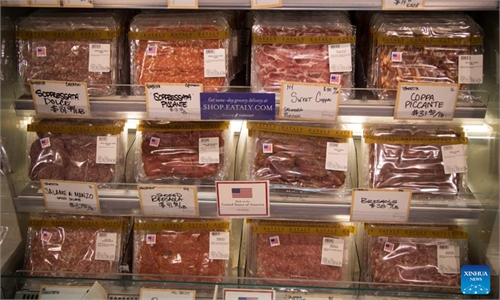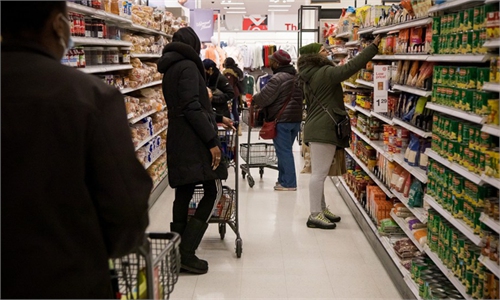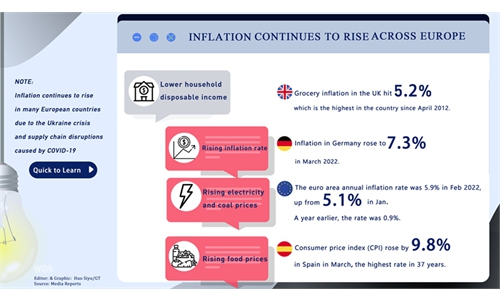
Consumers shop at a grocery store in Washington, DC, the US, March 10, 2022. Photo: Xinhua
As the latest raft of inflation data from around the world clearly points to the fallout of the Russia-Ukraine conflict and Western economic sanctions against Russia, it is preposterous to see some Western media outlets continue blaming China for global supply chain problems and high prices.The latest example is an article from Voice of America, the propaganda arm of the US government, published in Chinese on Thursday, whose headline claims that "China's lockdown has led to weaker demand for importers and higher prices in other countries."
It is true that the global economy is entering an era of high inflation at an accelerated pace. In the US, its Labor Department said on Tuesday the consumer price index in March jumped 8.5 percent over the past year, the sharpest year-over-year increase since 1981. In the UK, inflation surged to 7.0 percent in March from 6.2 percent in February, the highest level in three decades, according to the Office for National Statistics.
In the Eurozone, inflation surged to 7.5 percent in March, the highest level since the euro was created. In Russia, the annual rate of inflation accelerated to 17.49 percent during the week ending on April 8, the highest since February 2002 and up from 16.7 percent a week earlier, the country's economy ministry said on Wednesday.
Admittedly, multiple factors contributed to the skyrocketing inflation around the world, with the COVID-19 pandemic being a major one. But there should also be no doubt that soaring prices of energy and a slew of bulk commodities driven by the Russia-Ukraine conflict and the reckless US-led Western economic sanctions against Russia also exacerbated global inflation. Needless to say, it is too far-fetched to blame it on China's anti-epidemic measures.
Despite the complexity and costs of the dynamic zero-COVID policy, China has proved to be one of the most resilient countries in supporting the global supply chains. China's supply chains have not been cut off due to the epidemic, which is demonstrated by the robust growth in its foreign trade. China's total imports and exports expanded 10.7 percent year-on-year to 9.42 trillion yuan ($1.48 trillion) in the first quarter of 2022, official data showed Wednesday.
Against this backdrop, the US' recent eagerness to play up the impact of the zero-COVID policy on China's and the global supply chain is actually a failed attempt to pass the buck and a sinister plot to hide their failure and surrender to the virus and the massive costs of their economic sanctions against Russia.
At a time when global supply chains haven't fully recovered from the pandemic, the situation in Ukraine and the sanctions imposed on Russia have exacerbated disruptions to supply chains. With shortages seen in energy, raw materials and food supplies, countries around the world are bearing the brunt of Washington's geopolitical gambits.
While US and Western officials claim that their economic and financial sanctions are aimed at punishing Russia, but the truth is that these sanctions have also seriously harmed the interests of developing countries that are very vulnerable to high inflation when it comes to imports of food and other essentials. Many of these developing countries are already facing serious economic challenges, Western sanctions-induced price surges are to rub salt into a wound.
For instance, Sri Lanka's central bank announced this week that it would temporarily default on all foreign debt so as to preserve its dwindling foreign exchange reserves to import essential food and fuel. If anything, that's a demonstration of how emerging economies, especially those small and vulnerable ones, are suffering from the shocks from the reckless Western economic sanctions.
Inflation may mean price increases in developed countries, but in developing countries, high inflation can lead to food shortages and even trigger a widespread humanitarian crisis. There have already been growing warnings of developing countries in Asia and elsewhere facing serious energy and food shortages and economic crises.
Against such a dire picture, it is hoped that the West can refrain from finger-pointing and instead focus on serious efforts to address the growing list of economic troubles of serious global implications. As for the developing world, this calls for concerted effort to jointly preserve global free trade and economic globalization.



